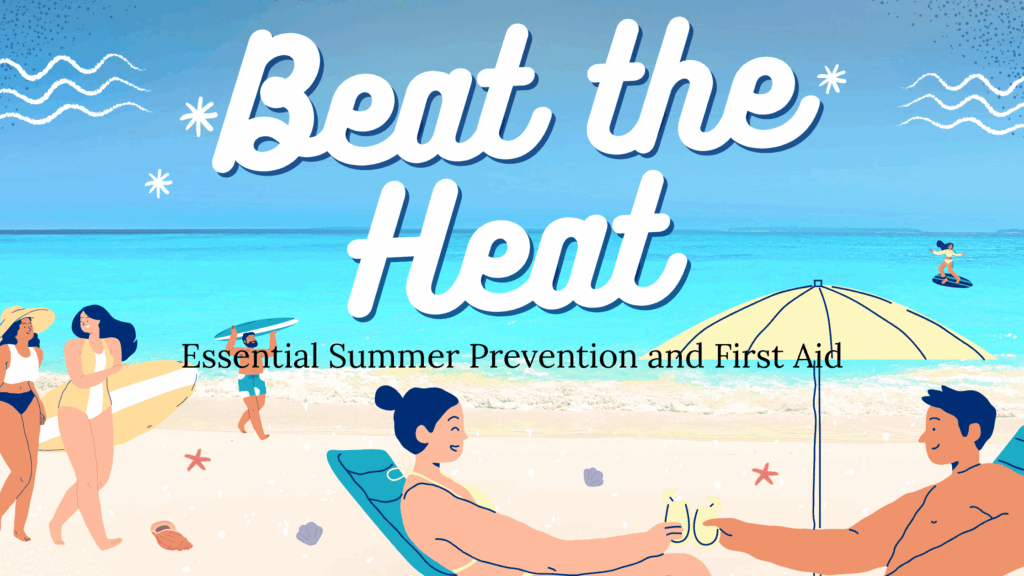Stay Safe and Beat the Heat: Essential Summer Prevention and First Aid
Tips Summer is a time of fun, relaxation, and outdoor activities. However, the hot weather and increased outdoor exposure can also bring a range of health risks. To ensure a safe and enjoyable summer, it’s crucial to be aware of preventative measures and have a basic understanding of first aid. This blog will explore some essential tips for summer prevention and first aid, helping you stay safe and make the most of this vibrant season. Stay Hydrated One of the most critical aspects of summer prevention is staying properly hydrated. Dehydration can lead to fatigue, heat exhaustion, and even heatstroke. Ensure you drink plenty of water throughout the day, especially when engaging in physical activities or spending time outdoors. Avoid excessive consumption of alcohol, caffeinated beverages, and sugary drinks, as they can contribute to dehydration. Sun Protection Protecting your skin from the sun’s harmful UV rays is vital during the summer. Use a broad-spectrum sunscreen with an SPF of 30 or higher and apply it generously to all exposed areas of your body. Don’t forget to reapply every two hours or more frequently if you are sweating or swimming. Wear protective clothing, such as lightweight, loose-fitting garments, wide-brimmed hats, and sunglasses to shield yourself from the sun’s rays. Heat-related Illnesses Summer heatwaves can increase the risk of heat-related illnesses. Heat exhaustion and heatstroke are serious conditions that require immediate attention. Recognize the symptoms, such as dizziness, nausea, rapid heartbeat, headache, and hot, dry skin. Move to a cool, shaded area, hydrate with water or a sports drink, and apply cool compresses to the body. If symptoms worsen or persist, seek medical help immediately. Insect Bites and Stings Warmer temperatures often bring out insects, making protecting yourself from bites and stings essential. Use insect repellents containing DEET, picaridin, or oil of lemon eucalyptus to keep bugs at bay. When spending time outdoors, wear long sleeves, pants, and socks, especially during dawn and dusk when mosquitoes are most active. If bitten or stung, clean the area with soap and water, apply a cold compress, and consider using over-the-counter antihistamines or creams to relieve itching and swelling. Seek medical attention if you experience severe allergic reactions or if the symptoms worsen. Water Safety Swimming and water-related activities are popular during summer, but it’s crucial to prioritize water safety. Follow basic water safety guidelines whether at the pool, beach, or lake. Supervise children closely, swim in designated areas, and never swim alone. If you’re not a confident swimmer, consider wearing a life jacket. Be cautious of strong currents, and stay informed about local weather conditions before entering the water. Basic First Aid Knowledge Having basic first aid knowledge is valuable in any season. Learn essential first aid techniques like CPR, choking response, and wound care. Keep a first aid kit readily available at home, in your car, or when traveling. It should include bandages, antiseptic wipes, gauze pads, adhesive tape, scissors, and any necessary medications. Understanding how to respond to common summer injuries, such as cuts, sprains, and sunburns, can make a significant difference in providing timely aid. Summer is a time to enjoy the outdoors and create beautiful memories. Following these essential summer prevention and first aid can significantly reduce the risk of common summer ailments and accidents. Prioritize hydration, protect yourself from the sun, and be aware of heat-related illnesses. Take precautions against insect bites and stings, practice water safety, and equip yourself with basic first aid knowledge. With these measures in place, you can fully embrace the season, ensuring a safe and unforgettable summer experience.
Stay Safe and Beat the Heat: Essential Summer Prevention and First Aid Read More »


